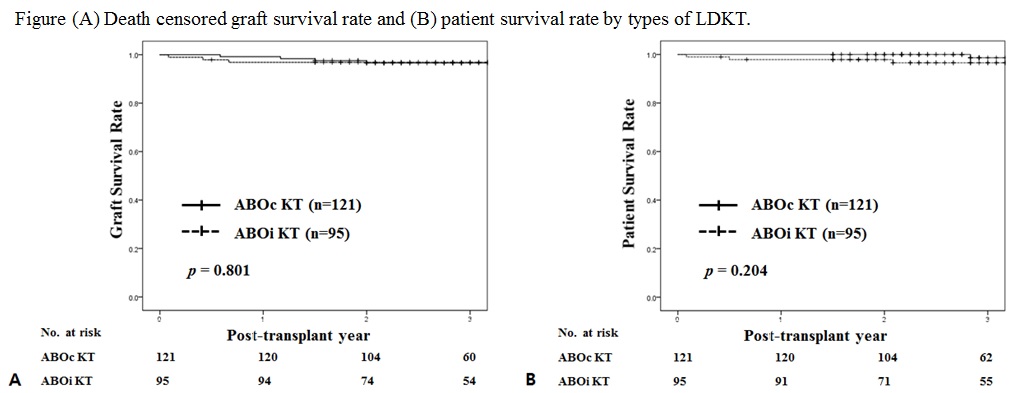Successful Launch of an ABO-Incompatible Kidney Transplantation Program to Overcome the Shortage of Compatible Living Donors: Experience at a Single Center.
1Transplantation Surgery, Yonsei University Health System, Seoul, Republic of Korea
2Nephrology, Yonsei University Health System, Seoul, Republic of Korea
3The Research Institute for Transplantation, Yonsei University College of Medicine, Seoul, Republic of Korea
Meeting: 2017 American Transplant Congress
Abstract number: A58
Keywords: Graft survival, Immunosuppression, Kidney transplantation, Plasmapheresis
Session Information
Session Name: Poster Session A: Clinical Science: Kidney Immunosuppression: Desensitization
Session Type: Poster Session
Date: Saturday, April 29, 2017
Session Time: 5:30pm-7:30pm
 Presentation Time: 5:30pm-7:30pm
Presentation Time: 5:30pm-7:30pm
Location: Hall D1
Introduction:ABO-incompatible (ABOi) kidney transplantation (KT) is being increasingly performed to overcome donor shortages. However, debate persists regarding the post-transplant outcomes of ABOi KT versus that of ABO-compatible (ABOc) KT.
Methods:A total 454 recipients who underwent living donor KT (LDKT) between June 2010 and July 2014 at Severance Hospital (Seoul) were retrospectively reviewed.One hundred ABOi and 354 ABOc KTs were compared. Recipients with a pre-transplant positive crossmatch to their donors, pre-transplant donor specific anti-HLA antibody (DSA), or high panel reactive antibody (PRA ≥50%) were excluded from both the ABOi and ABOc KT groups. Finally, the authors compared the transplant outcomes of 95 of these ABOi KTs and 121 ABOc KTs performed over the same period.
The results: No significant difference in incidence of biopsy proven acute rejection was observed between these ABOi and ABOc KT groups (P=0.230), and group glomerular filtration rate of ABOi KT was comparable to that of ABOc KT (P>0.05 at all time points). Three year death-censored graft survival rates were similar (96.8% vs. 96.6%, respectively; P=0.801). However, the incidences of postoperative bleeding, cytomegalovirus infection, fungal infection, and serious infection rates were significantly higher after ABOi KT.[table1] Conclusion:In this study, graft renal function and survival after ABOi KT were excellent and the incidence of acute rejection was similar to that of ABOc KT. However, efforts are needed to reduce hemorrhagic and infectious complications after ABOi KT. ABOi KT can be a good strategy to overcome ABO antibody barriers and relieve donor shortage.
Conclusion:In this study, graft renal function and survival after ABOi KT were excellent and the incidence of acute rejection was similar to that of ABOc KT. However, efforts are needed to reduce hemorrhagic and infectious complications after ABOi KT. ABOi KT can be a good strategy to overcome ABO antibody barriers and relieve donor shortage.
CITATION INFORMATION: Song S, Lee J, Lee J, Kwon S.-K, Kim B, Lee J, Kim Y, Kim M, Kim S, Huh K. Successful Launch of an ABO-Incompatible Kidney Transplantation Program to Overcome the Shortage of Compatible Living Donors: Experience at a Single Center. Am J Transplant. 2017;17 (suppl 3).
To cite this abstract in AMA style:
Song S, Lee J, Lee J, Kwon S-K, Kim B, Lee J, Kim Y, Kim M, Kim S, Huh K. Successful Launch of an ABO-Incompatible Kidney Transplantation Program to Overcome the Shortage of Compatible Living Donors: Experience at a Single Center. [abstract]. Am J Transplant. 2017; 17 (suppl 3). https://atcmeetingabstracts.com/abstract/successful-launch-of-an-abo-incompatible-kidney-transplantation-program-to-overcome-the-shortage-of-compatible-living-donors-experience-at-a-single-center/. Accessed February 21, 2026.« Back to 2017 American Transplant Congress
